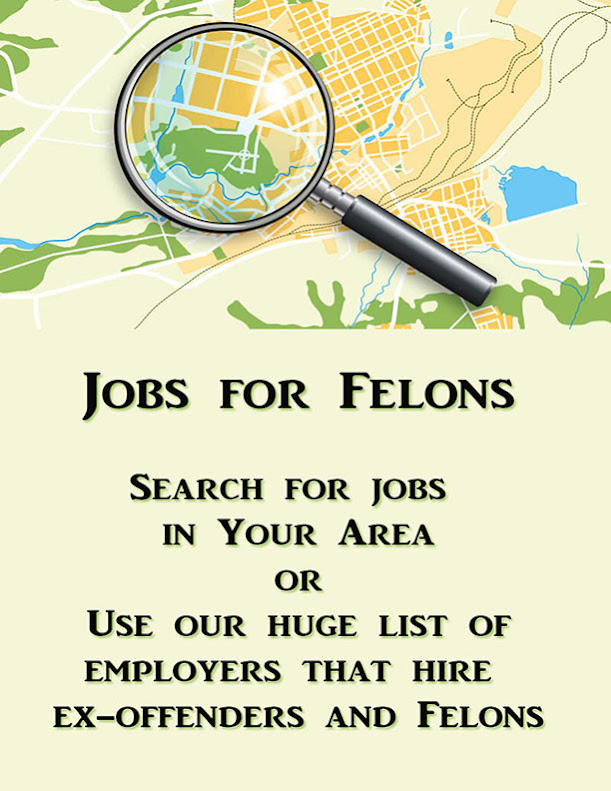Jobs for Felons: Educated Felon is Looking for Good Job
Hello,
I came across your blog on jailtojob.com and read an entry from 2015 that
pretty much reflects what's currently going on in my long time
boyfriend's life. He recently got his second felony for a drug
conviction in 2016. He previously was out of trouble for 10
years, and was actually on his way to obtain his certificate of
rehabilitation. Unfortunately, that's no longer on the table now
that he has his recent conviction on his record. He's currently
serving his probation, but is due for a review in court next week
to see if he can get off early (keeping our fingers
crossed).
I'm sure as you well know, it is extremely difficult for an
ex
felon to find gainful employment. It's incredibly
discouraging, even for me. I try to be positive and be some sort
of resource for him, but he has a very self-defeating attitude
right now and I just want to help him. Yes, I recognize that he
has made it much more difficult for himself to find a job with a
good salary and benefits, but I'm more of an optimist and I try
my best to believe that something will come along, if he puts in
the work.
He is educated (he has his BA from Cal State Northridge in
Psychology) and has work experience in the respite health field.
He now believes that is no longer an option for him, once they do
a background check he'll be denied. He is very well spoken, and
is like a chameleon- he is able to integrate himself pretty
effortlessly into anything he puts his mind to...he just needs
that opportunity to prove it. He needs someone who is
willing to give him a chance to provide for himself, his family
and start preparing for his future.
Do you have any advice? A direction we can go into that will help him find a job that he will find rewarding, and gainful? I am aware of the Federal Bonding program and have that to bring to the table, but he is very discouraged, depressed and going through some type of learned helplessness. I just want to find something for him to be successful at. Anything I suggest, he seems to retort with a reason why it won't work out. His probation officer is no help, and is hardly familiar with his case. He hasn't offered any assistance or resources and when I ask my boyfriend to inquire about it with his PO, he shrugs it off and says things like, "i'm just a speck in his caseload". He also doesn't want to bring any unwanted attention to himself, so as to not cause any problems.
I'm at a loss. I myself am working a salary job, but it certainly
isn't enough and I know he will only be happy once he's offered a
position that will grant him the ability to provide a comfortable
life for himself and his family. I don't want him believing that
he is only destined for a minimum wage job for the rest of his
life....
Anything helps,
Jessica
Jobs for Felons: Educated Felon is Looking for Good Job
Hello Jessica,
 It
seems that your boyfriend has dug himself a bit of a
hole. All is not lost. One thing I might try is the
local community college. Community colleges are always
looking for adjunct instructors to teach freshman
classes. Adjunct instructors are used on an as-needed
basis but it is a great way t0 get
a start in the professional world.
It
seems that your boyfriend has dug himself a bit of a
hole. All is not lost. One thing I might try is the
local community college. Community colleges are always
looking for adjunct instructors to teach freshman
classes. Adjunct instructors are used on an as-needed
basis but it is a great way t0 get
a start in the professional world.
Another thing to try is contact your local councilperson.
Council members in touch with a lot of things and people in the
community. They may know of open positions in the
area, Remember council members are politicians and every
person is a potential vote.
 Another
option is to apply for temporary employment. Working for
a temporary agency is a great way to quickly get a job.
Often temporary assignments turn into permanent jobs.
Some agencies have clients that require professional
employees. The key to felons applying to temporary agencies is to
apply to smaller, privately owned agencies rather that large
national companies. Sometimes larger companies have
guidelines that prohibit the hiring of felons. Smaller
agencies are free to hire anyone they choose so your boyfriend
may have better luck with them.
Another
option is to apply for temporary employment. Working for
a temporary agency is a great way to quickly get a job.
Often temporary assignments turn into permanent jobs.
Some agencies have clients that require professional
employees. The key to felons applying to temporary agencies is to
apply to smaller, privately owned agencies rather that large
national companies. Sometimes larger companies have
guidelines that prohibit the hiring of felons. Smaller
agencies are free to hire anyone they choose so your boyfriend
may have better luck with them.
Frequent readers of my blog know that everyone I speak to who
is looking for a job I direct to the local One-stop Career
Center. Each
state has a network of centers that offer a variety of free
services that can assist you in finding employment. In
addition, these centers offer a wide array of services that can
help a felon get jobs.
Some services available are:
Some services available are:
Counselors for One-on-one Assistance
Computers with internet access and word processing
Lists of thousands of job listings
Printers, fax machines, phones, and copiers for job search
use
Each center has counselors there that help clients in their
job searches.
You can find the nearest location of the One Stop Career
Center in your local phone book or on the web at:
I hope this helps.
Jobs for Felons: The Facts about Companies that Hire Ex offenders and Felons (2018)
Jobs for Felons: Five Places Felons Can Find Jobs - Get a Job Quickly!
companies hire felons | companies that hire felons | Companies
that hire ex-offenders | Employers
that hire ex-offenders | employers
that hire felons | Jobs for felons | jobs for
ex-offenders | jobs that hire felons | places
that hire felons | felon friendly jobs | felon friendly
employers | how to get a job with criminal record | second
chance jobs for felons | temp agencies
that hire felons | high paying jobs for
felons
Eric Mayo




















